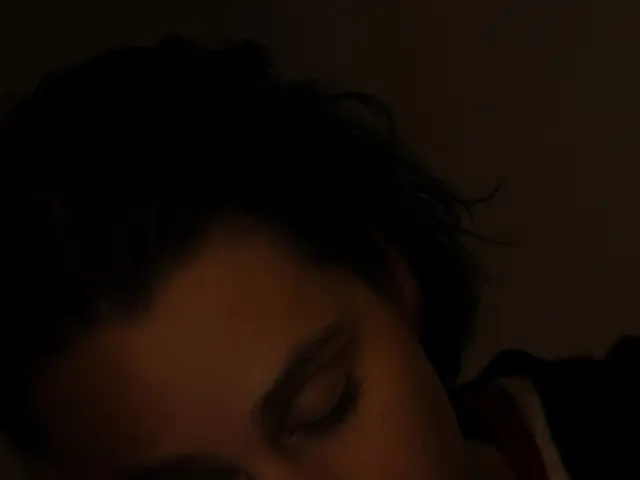Discussing the Importance of Addressing Postpartum Obsessive-Compulsive Disorder in Greater Detail
A brand-new little person in your life can be a joy, from those precious tiny fingers to that adorable peach fuzz hair. But, as any seasoned parent will tell you, the newborn phase also comes with its fair share of terrors – primary among them being the overwhelming responsibility of keeping your little one thriving without any hitches.
But what if your thoughts are consumed by a plethora of grim possibilities that could spell danger for your baby? What if the fear of something going wrong casts a dark shadow over all those cherished, heartwarming moments?
When you're grappling with postpartum OCD, those dread-filled thoughts about your baby meeting an untimely end, or worse, being harmed by you, just won't seem to budge.
Shining a Light on Postpartum Mental Health
You might have heard a thing or two about postpartum depression with some high-profile personalities openly discussing their struggles. Any effort towards destigmatizing postpartum depression is undoubtedly a win for raising awareness about postpartum mental health, but it's also crucial to shed some light on lesser-known perinatal mood and anxiety disorders like postpartum OCD.
Around 3% to 5% of new mothers experience postpartum OCD, with symptoms typically appearing soon after giving birth or within the first four to six weeks postpartum. Shockingly, in one study of individuals with OCD, half of the female participants claimed that the birth of their child triggered their OCD. In another study, nearly half of women with preexisting OCD reported a worsening of symptoms during the postpartum period[1][2]. Maybe postpartum OCD is more common than we think?
Facing the Monster: Postpartum OCD
Postpartum OCD usually afflicts the mother or birthing parent and revolves around disturbing, irrational thoughts about harm befalling your baby. These thoughts may go beyond regular parental anxieties and include fears of drowning, dropping, contaminating, causing someone to choke, molesting, or inadvertently injuring your baby[3].
It's important to recognize that these thoughts are far from what you'd ever want to do and do not make you a bad person. However, simply having these thoughts can trigger fear and shame, and they can spirals into rumination and compulsive behaviors such as excessive handwashing or baby washing, hypervigilant monitoring, or avoiding your baby altogether.
Understanding the Origin: Why Postpartum OCD Happens
Pregnancy and the postpartum period are known to trigger new onsets or worsen pre-existing symptoms for mood disorders like OCD. One possible factor that could be at play is hormones.
"Looking back, we can see that symptoms often start or worsen around the time of hormonal changes," says Dr. Juan Aparicio, a psychiatrist at the UW School of Medicine, Department of Psychiatry and Behavioral Sciences who specializes in women's mental health. "Postpartum OCD appears to be closely linked to hormonal fluctuations, so maybe this connection isn't so surprising."
The exact cause of postpartum OCD is still not fully understood, but experts suspect that a family history of OCD, anxiety, and the colossal life-changes that come with pregnancy and parenthood may all play a part in its development.
Dance of the Doppelgangers: Differentiating Postpartum OCD from Others
It can be tricky to distinguish postpartum OCD from other perinatal conditions like postpartum anxiety, depression, and psychosis.
Postpartum Anxiety
Anxiety is fairly common in new parents, and the fears of harm befalling your baby are alarmingly high. Anxiety typically pikes after delivery and within six weeks but can appear anytime within that first year[3]. Physical symptoms may include chest pain, head and stomach aches, and even panic attacks characterized by shortness of breath, shaking, and sweating.
Postpartum Depression
Most new parents experience the "baby blues" for a few days, characterized by feelings of anxiety, overwhelm, mood swings and trouble sleeping. If these feelings persist longer than two weeks, it may be wise to consider evaluation for postpartum depression, which is different because the symptoms can be severe and long-lasting. Symptoms include excessive crying, struggles with bonding, withdrawal from loved ones, intense irritability, severe anxiety, and feelings of hopelessness. These symptoms tend to interfere with your daily life[3]. In the most extreme cases, postpartum depression can develop into postpartum psychosis, which is a true psychotic disorder that requires immediate medical attention.
Postpartum Psychosis
Postpartum psychosis is a medical emergency and should not be confused with postpartum OCD, even though the two can share similarities. While postpartum OCD involves obsessing over protecting your child, postpartum psychosis involves delusions of harming your child or thoughts of planning to harm your child[4]. In either case, reach out for emergency medical help immediately if you experience any worrying symptoms.
Akey in the Door: How Your Doctor Can Help
When it comes to diagnosing postpartum OCD, there isn't a specific test doctors administer to new mothers.
"Postpartum OCD is often identified through anxiety screenings we conduct after giving birth," explains Aparicio. "We usually see something in these screenings that looks more like OCD, which prompts us to suggest a visit with a specialist."
Your doctor will also use the GAD-7 Anxiety Scale to check on your postpartum anxiety during baby check-ups.
"Asking if you're having scary, unwanted thoughts is one of the easiest ways to initiate a conversation," says Aparicio. "Then asking more specific questions like, 'Are there rituals or routines that you've started that are taking over your day or interfering with your parenting?' will help pinpoint any potential postpartum OCD symptoms."
It's essential to distinguish everyday parental anxieties from postpartum OCD. For example, peeking at the baby monitor or walking quietly by the baby to ensure all is well is within the realm of normal behavior. On the other hand, setting alarm clocks for hourly baby checks or consistently waking the baby up to verify they're breathing might indicate postpartum OCD.
Another crucial distinction is assessing the impact of your time spent on baby-centric obsessions and compulsions, such as house cleanliness, checking on the baby, and whether they are interfering with your ability to bond with your family and adequately care for your baby[2]. If these activities are preventing you from being the parent or partner you want to be – or hindering your personal well-being – it's time to seek help.
"We recommend reaching out if you spend more than one hour a day on these compulsions or obsessions," says Aparicio.
One reason postpartum OCD is often overlooked is the pervasive shame and fear surrounding having scary thoughts about your child's safety – especially during a time that's supposed to be all about love and nurturing. You may also fear that if you voice your concerns, there's a risk of losing your baby. But remember, it's essential to speak up and reach out to your healthcare team for help if you think you might be suffering from postpartum OCD.
"It's crucial to note that people with OCD are not dangerous," says Aparicio. "We should focus on the intrusive thoughts and not on the person struggling with them. Seek help, and remember that you don't have to suffer in silence."
Embracing Healing: Treatment Options and Community Support
Though treatments specifically designed for postpartum OCD are not yet abundant, general OCD treatments have proven effective.
"It seems that what works for OCD outside of postpartum is still effective," explains Aparicio. "Medication like SSRIs and SNRIs can help manage symptoms. And therapy like CBT, particularly ERP, has been shown to be highly beneficial for OCD."
Building a support network of family, friends, or support groups is also crucial in managing postpartum OCD, as is taking care of yourself through activities that promote relaxation and lower stress levels. With care, support, and treatment, a better future awaits those who are suffering from postpartum OCD.
"Don't cope alone," advises Dr. Esther Moy, an OB-GYN at the Childbirth Center at UW Medical Center - Northwest. "Reach out to your loved ones for help with meals, transportation, childcare, and rest. They are a valuable resource for ensuring your mental health is looked after during this demanding period."
If you're experiencing postpartum OCD, remember that you're not a bad person, and you're certainly not alone. Seek the help that you deserve, and take the important step towards reclaiming your peace of mind.
[1] https://www.ncbi.nlm.nih.gov/pmc/articles/PMC6754455/[2] https://www.ncbi.nlm.nih.gov/pmc/articles/PMC6135193/[3] https://www.mayoclinic.org/diseases-conditions/postpartum-depression/symptoms-causes/syc-20365075[4] https://www.mayoclinic.org/diseases-conditions/postpartum-psychosis/symptoms-causes/syc-20364979
- Despite the efforts to destigmatize postpartum depression, it's equally important to raise awareness about lesser-known perinatal mood and anxiety disorders such as postpartum OCD, which affects around 3% to 5% of new mothers.
- When handling postpartum OCD, it's essential to recognize that intrusive thoughts about harm befalling the baby are not uncommon, but if these thoughts persist and lead to compulsive behaviors, it may be helpful to seek professional help.
- Treatment options for postpartum OCD include general OCD treatments like medication (SSRIs and SNRIs) and therapy (CBT, particularly ERP), and building a support network of family, friends, or support groups can also aid in managing the condition.








